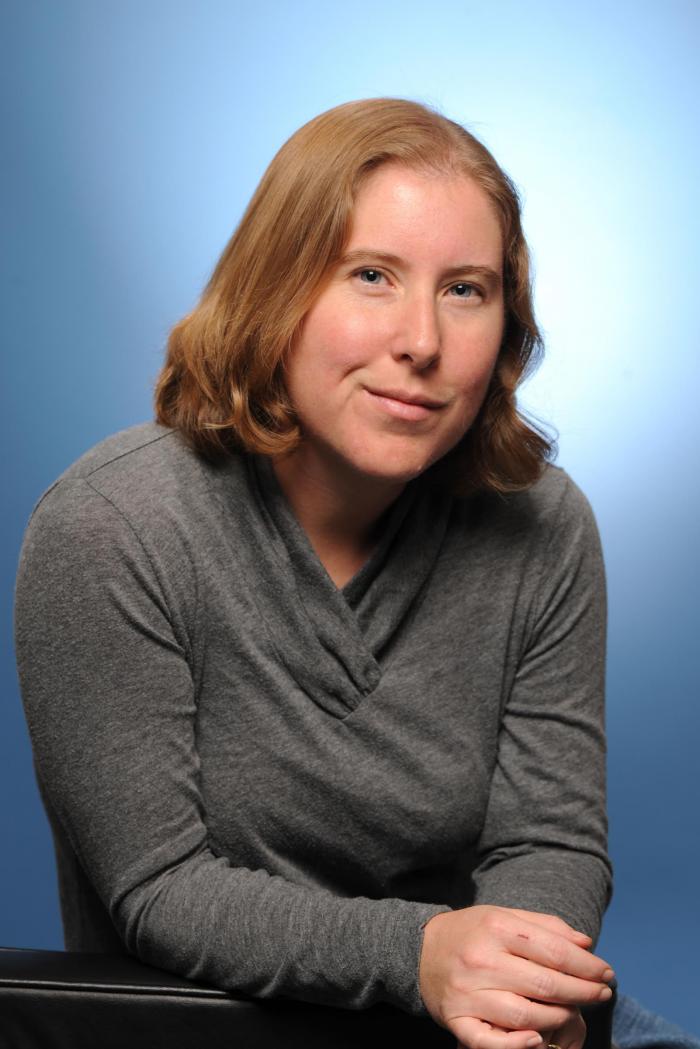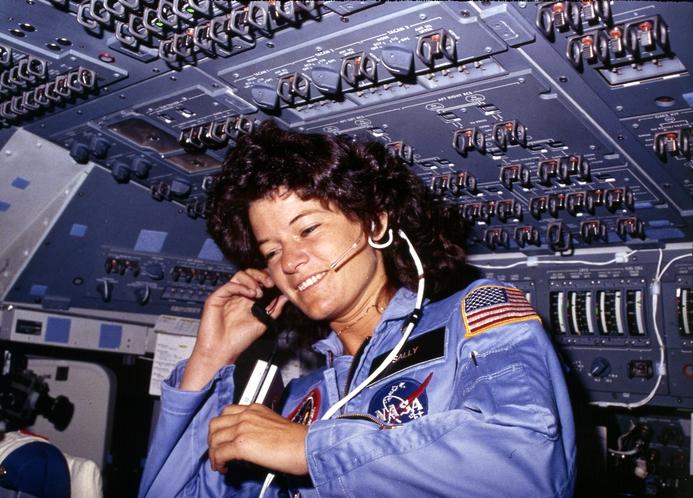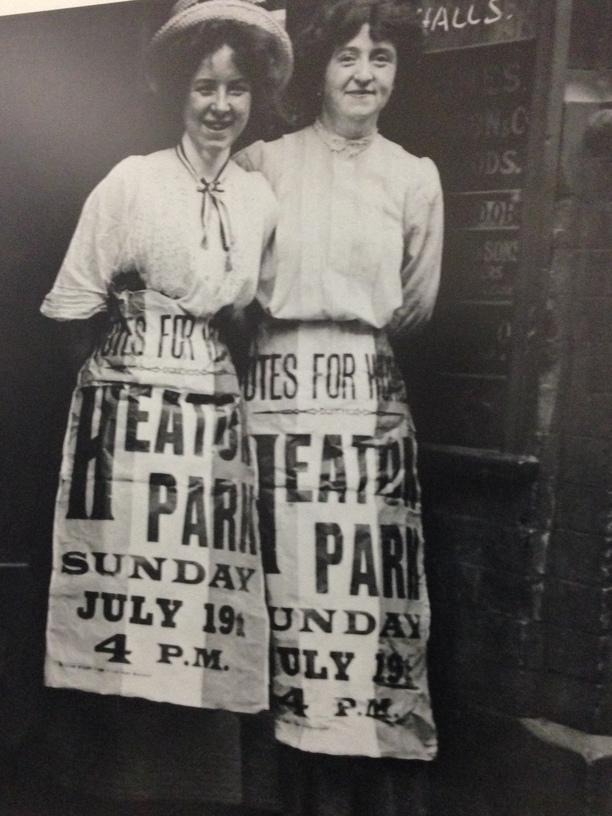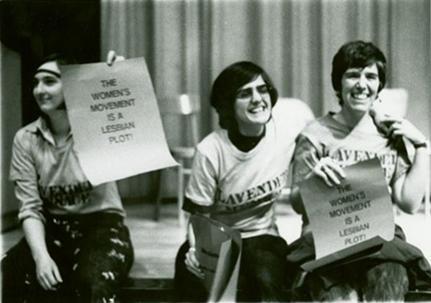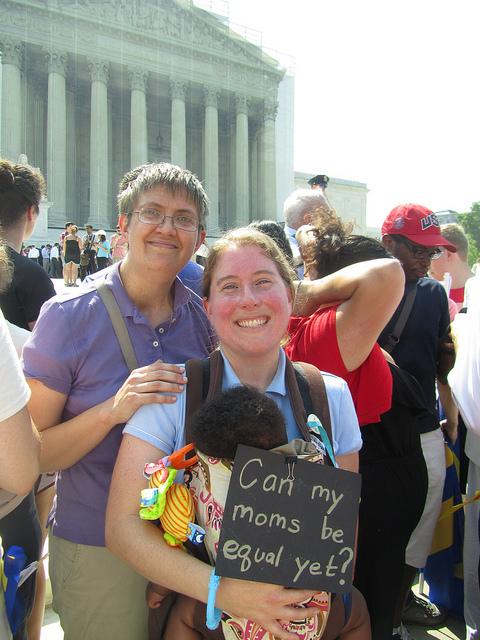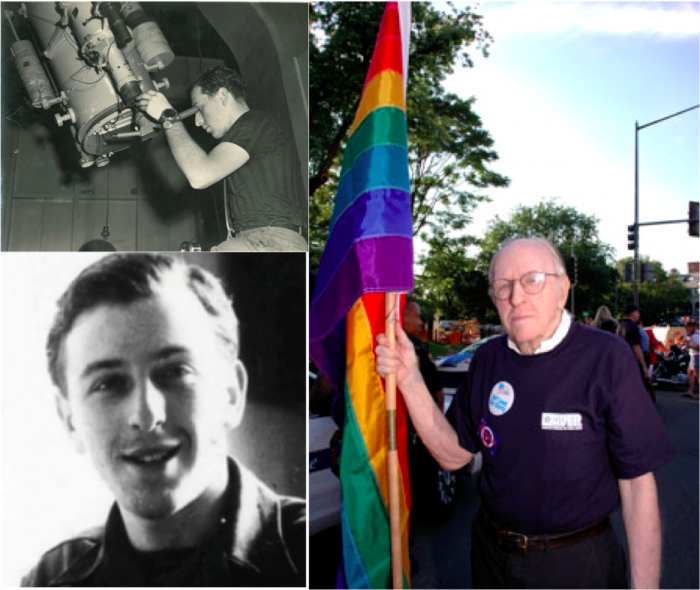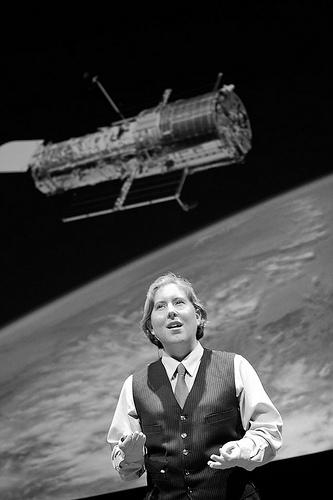Dr Jane Rigby is a civil servant Astrophysicist at the NASA Goddard Space Flight Center. She investigates how galaxies and black holes evolve, and currently serves as the Deputy Project Scientist for Operations for the James Webb Space Telescope.
Dr Rigby was a double major in Physics and Astronomy at Penn State, and received her M.Sc. and Ph.D. in astronomy from the University of Arizona. She held Spitzer and Carnegie postdoctoral fellowships at Carnegie Observatories in Pasadena CA before landing her job at Goddard. In 2013 Dr Rigby was awarded the Robert H. Goddard Award for Exceptional Achievement for Science.
A member of our community, Dr Rigby kindly gave this interview to SGMA this week.
SGMA: What do you think are the main problems queer astronomers face?
Jane Rigby: Right now our experiences are all over the map. Some of us are living the dream — having a blast doing science while living open, authentic lives. Some of us are fighting to survive, in the midst of hostile workplace climate, homophobic laws and policies in some countries and institutions, or a basic lack of safety.
Historic court and policy decisions in the U.S. have brought huge changes over the past two years. We’ve moved from legal, state-enforced discrimination toward Equal Justice under Law. My thinking’s now turning toward individual departments, to issues of climate, and especially toward improving the climate for transgender colleagues and people of color in astronomy.
Personally, I’m struggling to understand why some departments have supportive environments that encourage their people do do their best science, and other departments are dysfunctional and toxic. Why do some departments protect serial predators, hire clones of themselves, or reward bad behavior? We have to build communities where our scientists are supported and valued for the many aspects of their identity. When a person can be their authentic self at work, I strongly believe that they will do more brilliant, creative science. Diversity is a huge strategic advantage for departments, but most still treat it as peripheral, or even counter-productive.
SGMA: Can you tell us a bit about your coming out experience in the workplace? Did you fear that it would affect you professionally? Did you come out post, or pre-tenure?
JR: I’ve been out since 2000. My story’s simple — I fell in love with a fellow grad student in the department. It was a close-knit department, so hiding would have been ludicrous. Nor did I want to hide the best thing in my life! So, we were out as grad students. I certainly heard people say awful homophobic things at work there. They weren’t directed at me, and they weren’t said by people with power over me. If I recall, I was much less afraid of homophobic discrimination at work, than I was afraid of the two-body problem, and the lack of support we would receive as a same-sex couple in astronomy. That fear turned out to be justified. I’ve seen numerous different-sex couples get a wide range of support in solving the two-body problem, which was never offered to us.
SGMA: Tell us about role models. Did you have any more senior queer scientist to look up to when you were a student or postdoc? If yes: How did that help out? If not: How do you think it would have helped?
JR:One of my biggest role models when I was young was Dr. Sally Ride. A few years ago, on her deathbed, Dr. Ride chose to write in her obituary that her life partner had been a woman. Dr. Ride was the most influential woman scientist when I was growing up — the person that made me say, “I want to do THAT when I grow up.” It was because of her that I realized that astrophysics was a profession, that physics was a subject girls could study, that NASA needed astrophysicists. So I’m so… amused, I suppose, that Sally Ride was this influence on my life’s path, at a time when I was completely unaware that it was even possible to *be gay* — and at the same time, she was gay, in love, and deeply closeted to keep her job.
I want to be clear that I don’t blame Dr. Ride for staying in the closet until her death. She was of my parents’ generation; they were raised to treat sexual orientation as a dark secret. There was no anti-discrimination protection for federal employees then; had she come out, it would have ended her career, and caused a hurricane in the press.
But you asked about role models when I was a student or postdoc. I was completely alone as an in-denial, closeted undergraduate — no support at all. As a grad student, after a few years I discovered the LGBTQ Astro yahoo group, and the annual LGBT dinners at the winter AAS. That was a lifeline. It wasn’t so much that I needed role models, as I needed existence proofs. Here were gay people, and they were astronomers, and they were surviving, and some of them had even found JOBS. The AAS dinner was word-of-mouth and kinda closety in those days, ‘Psst, there’s a dinner”, so I didn’t find out about it until my third or forth AAS meeting. If I had a time machine, I would find my 1999 undergraduate self, at my first AAS meeting, in a double-breasted suit standing nervously all day in front of my poster, and drag her to the LGBT dinner. Helped? Oh, my, that would have helped.
By the time I was a postdoc, it was all easier, I knew several other queer astronomers, and I was stronger and better at fighting.
SGMA: Is it harder to be a gay person in science or a woman in science? A study suggests that often gay women think their gender is more of a barrier to success at work than their sexual orientation. Which one is more hurting, sexism or homophobia, and why?
JR: It very much depends on the individual. A transgender woman and a cisgender woman, a femme bi woman and a butch lesbian, are all going to have different experiences. A person at a progressive institution will have a different experience from a person at a dysfunctional institution. So I can’t answer the question generally.
Specifically, my own experience is that it has been much harder to be a queer person in science than a woman in science. For years I was compensated less than my peers because I couldn’t put my partner on my health plan. When I moved to Arizona, it was still against state law to be gay. I didn’t look abroad for fellowships because of the impossibility of a visa for my partner. When I got fellowship offers, I had to haggle for partner benefits. So systematically, at each stage, the gay thing has been the barrier. The woman thing has been there, of course — I get interrupted and talked over by male colleagues like other women. But for most of my journey, it’s been less of a barrier.
In part that’s because I’ve gotten off relatively easy as a woman in science. I’ve been lucky not to have faced the predatory sexual harassment experienced by some of my brave female astronomer colleagues.
SGMA: For some women being gay is a cause for concern at the work place. Some say they were unsure about how to turn their sexual orientation into a positive aspect of their work persona. What is your view on this?
JR: My experience is that absolutely I am a *better* astronomer because I’m queer. For a few reasons. First, I see things different than my colleagues. On mission work, as we weigh a decision, my first thought is always the community impact: "If we do things this way, who benefits, and who gets left out in the cold?” Will this policy create inclusion, or marginalization? I think about science in terms of community-building. What team do we need to tackle a given science problem, with skills that are different from mine? Absolutely I think that way because I’m an outsider, because I’ve been marginalized. And because community-building is central to LGBTQ culture.
Second, for years, the only leadership training I’d had was as an LGBT activist. Asking people what they needed to be successful at a task; thanking them; finding out what motivates them; bundling negative feedback with positive feedback. I use those skills every day. As I’ve gotten more senior, I’ve taken some amazing leadership classes. But my basic training in leadership was as an LGBT activist.
Third, I think that surviving as an LGBT person has given me more resilience. You said something condescending to me at a meeting? I’ve had Westboro Baptist Church scream at me. I’ve had the legitimacy of my own marriage debated in the Supreme Court of California, and the Supreme Court of the United States. You don’t scare me.
I’ve had some surprised, negative reactions from male colleagues the few times I’ve mentioned that there might be professional advantages to being queer. I think it’s in part because they’re still in the mindset where difference is by default a negative that at best can be zeroed out. "He’s Latino BUT he’s a great scientist.” Or, they swap it, and say, “Well, I couldn’t say that I’m a better scientist because I’m straight.” But that’s ignoring power dynamics, which is the most common mistake astronomers make when thinking about diversity.
SGMA: A wordy question. It is no secret that there is a negative bias toward women when it comes to being perceived as aggressive when assertive in the work place. For men it is seen as a sign that they are leaders, whereas for women, the same trait is disproportionately negatively described as "abrasive". On the other hand, another bias is that the image of a successful woman is heavily associated with the stereotype of an aggressive lesbian (old-school white heterosexual males are more prone to respect a lesbian that can play their game than an effeminate gay guy), that lesbians basically would have a green light to depart from the feminine stereotype. Which bias (against you or in your favor) have you felt most, if any?
JR: It’s certainly true that some of the techniques that worked for our male mentors will not work for professional women. Women can’t lead like men — they will be punished for it. There are classes and books on what authentic "Women’s Leadership" looks like. Women have to lead with softer power than men — that’s just the landscape, and it’s regrettable. But it’s also an opportunity to shift toward leadership styles that build consensus and collaboration.
There are so few lesbians in science that I don’t have any evidence to assess your hypothesis that hard-assed lesbians would get more respect.
It’s worth pointing out that sexual orientation is decoupled from gender presentation. Your question is about gender presentation. There’s been a lot written about how there’s no right way to dress as a woman in science. You’re under-estimated (or mistaken for an undergrad) if you wear a skirt, but can be seen as aggressive or mannish if you wear pants. Queer theory is useful here — butch/femme and gender identity are two useful concepts to think about dress and gender presentation beyond the binary.
SGMA: At least one gay woman has lamented that many of the activists for women in science saw her as an unsympathetic distraction from their goal of enabling the straight woman scientist to raise a wholesome nuclear family. What is your view on this? Is there a divide between gay and straight women in astronomy?
JR: Oh, yeah, this issue has divided women astronomers over the past few decades. The concerns of queer women have frequently been dismissed as unimportant, distracting, or de-legitimizing the concerns of white, straight, cisgender women on the tenure track. (The “real women”.) We would try to point out that an issue discriminated against queer women astronomer, for example a family leave policy that excluded non-bio moms or adoptive parents. Or even suggest nicely that we use the word “partner” instead of husband. Over and over, the response was that these were not the concerns of women in astronomy.
For this reason I tuned out CSWA for the better part of a decade; it was too draining. The men were already telling me I didn’t belong. I didn’t need the women to say so, too.
This history is well known among lesbian astronomers of a certain age. Fortunately, I think there’s been real positive evolution over the past few years. The creation of WGLE has helped. So has Inclusive Astronomy 2015, which was held to wrestle with the concerns of queer astronomers, of people of color, of women — and which accepted as a core truth that many of us hold more than one of those identities.
SGMA: Aside from workplace climate, have you had experience with *legal* workplace discrimination?
JR: When I started at NASA, I couldn’t put my wife on my health insurance plan, because the federal government refused to recognize same-sex marriages. That was a difference in compensation of thousands of dollars per year. Had my plane crashed on the way to a conference, my wife wouldn’t have received the survivor benefits and death-on-the-job benefits that a different-sex spouse would have received. We paid thousands of dollars in extra taxes every year. I want to stress that I was blessed with a positive workplace climate and supportive colleagues. But the law was against us, and we paid the financial cost.
In 2013, in Windsor, the U.S. Supreme Court struck down the Defense of Marriage Act. My wife and baby and I were in the crowd outside Court when the decision came down. It’s hard to describe how profoundly I felt that victory. My government, my employer, could no longer discriminate against me and my family. I had clipped a sign to kiddo’s stroller, “Can my moms be equal yet?” The answer, in Windsor, was YES.
A few weeks later, a NASA human resources counselor called me to walk me through all of the compensation benefits to families of government employees, that we’d been denied and could now use. Health insurance, survivor benefits, flexible savings accounts, the works. It took an hour, and I was amazed at the scope of it. Now that we’re on one health plan and can file joint taxes, we save thousands per year, which we’re putting into the kiddo’s college fund.
SGMA: Tell us about your advocacy about the recognition of Frank Kameny's work toward LGBT equality.
JR: Frank Kameny is the most famous astronomer that most astronomers have never heard of. Please, go watch my youtube slideshow about Kameny. https://www.youtube.com/watch?v=BIGs4t-tHNk I summarize how revolutionary was his thinking, how profound the impact of his advocacy, and how much we as a scientific community lost by throwing brilliant people like him out of the field.
In 2012 the AAS recognized Dr. Kameny for his activism. The organizing to get an award for Kameny happened at the same time as the organizing to form WGLE. Sadly, we had to recognize him posthumously, as Dr. Kameny died shortly before the AAS would have invited him. His literary executor, Charles Francis, said that astronomy was the one circle not closed in Frank’s long life. He lived to see the District of Columbia, the Federal government, and the armed forces admit that they were wrong and he was right — that gay people were entitled to equal treatment. I regret that Dr. Kameny didn’t get to hear a thousand astronomers invite him to our meeting as a colleague, thank him for his service, and introduce him to proud, out gay astronomers who are allowed to practice astronomy in large part thanks to Kameny’s lifetime of activism.
I’m also pleased that there’s now an asteroid named Frankkameny, number 40463. His friends have told me that Frank would have gotten a kick out of becoming a heavenly body.
SGMA: Advice for more junior queer astronomers starting their careers?
JR:
1) Do fabulous science, be fabulous, and be proud.
2) Self-care is important. If you do not care for yourself, you will burn out.
3) Spend time in the queer community. The culture of astronomy, which is a straight white male culture, may at times feel suffocating. Keep an oxygen line to outside communities that share your values and that value you. I know this is hard when you’re working late into the night. But, see #2.
4) Pick your battles. You cannot solve all of the dysfunction in Astronomy's culture. But do something.
5) Observe your senior colleagues, and think carefully about how you would do things differently when you have more power.
6) Adapt in superficial ways to survive, but keep your core values.
7) Cultivate several mentors, from different perspectives.
8) Tell us at SGMA what we should be doing to support you.Photo by Tim Forbes, at TEDxMidAtlantic 2011


